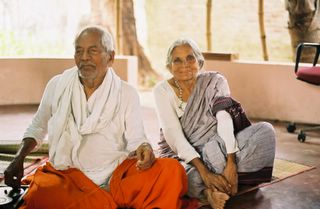Elam Selkuthum

Veerasami (and now more of the staff) have been teasing me. They are either trying to get me to pronounce “Elam Selkuthum” (“Everything is Possible”, a favorite saying of Saint Ramalinga) properly, or are simply enjoying my awkward or perhaps impossible attempts at it. They say it, I repeat, and then they say it again, and I have not the foggiest notion as to whether I managed it correctly or not.
At any rate, Krishnammal and I had a brilliant meeting with Sriram Ayer, the founder of Nalanda Way, an extraordinary young man who has agreed to put together “Friends of LAFTI – India” for us. Sriram was an IT executive, head of European operations for a large IT company. He tells the story that in 2003, already upset by the killings of Muslims in Gujarat, he was sitting in his office in Chennai one evening, when a 9- or 10-year-old incense seller came into his office. About to throw him out, Sriram learned that the boy sold incense during the evening and night so that he could go to school in the daytime.
Sriram quit his job the next morning, and without any experience, founded Nalanda Way, an organization dedicated to helping marginalized, poverty-stricken, and abused children through opportunities and mentoring in the arts. (www.nalandaway.org) He is also an Ashoka Fellow, appointed for a three-year term because of his deep commitment to social entrepreneurship. Meeting him was like meeting a long-lost brother, and I am glad that we will be able to welcome him to our widening family. And the story of the boy reminds me that, even when we may not realize it, we are all lamps for each oher. Somewhere in Chennai there may be an unheraled teenage boy - homeless still perhaps, and maybe still in school or perhaps not - who is at least partially responsible for bringing joy and healing into the lives of thoussands of children in need of them.
Bless.
Ah, my India! It is the ground that the imaginations of the gods tread upon, their feet never touching the ground. And I have been blessed with knowing more than my share, as they are lamps to me. And that is why I'm repeatedly called upon to return.
Well, I am planning to leave. Sad, of course, but satisfied at the same time. I feel like I have accomplished what I needed to (as to the exhausted prawn-farm lands, we’ll have to see about that.) And I feel energized (as I always have when leaving Krishnammal – the challenge for me now is to figure out how to stay for longer periods of time.)
The Times of India quoted me in an article on the housing movement today. Or I should have said, ‘misquoted’ me, as much of it isn’t even close to what I told them. But the gist of the article is fine. And the reality is that, when all is said and done, we don’t know yet how many houses we will build, what the final cost will be (we are now working on free sand for the brickmaking, whether we will end up with one brickmaking machine or ten, whether the roofs will be all-tiled or just half.
But this I do know: Elam Selkuthum.
Everything is possible.

